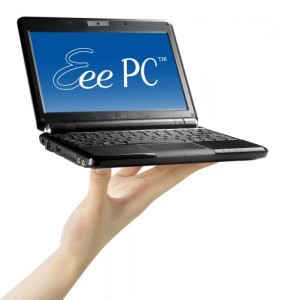Last week I finally took the time to upgrade my Asus Eeepc 1000H to the latest Slackware-current.
I had two issues after the upgrade, which were related to the new 2.6.33 kernel.
- My WPA-secured wireless connections would not last longer than a few seconds. After days of despair, I finally found out that the 2.6.33 kernel has a new driver for my wireless card, the “rt2800pci”. This driver is being loaded by default now. Slackware’s kernel also ships the “rt2860sta” driver which is part of the Linux “staging area” i.e. not considered fully stable. This is the driver which would be used with Slackware kernels before 2.6.33. It is in fact a very stable driver which never failed me before.
By coincidence I saw that both modules were mentioned as supporting the Eeepc’s wireless card in the output of “lspci -v”. After I added the line “blacklist rt2800pci” to the file “/etc/modprobe.d/blacklist.conf” and rebooted the Eeepc, I had fully functional and stable wireless connectivity again, now using the “rt2860sta” driver! - My sound was gone, or at least working at a very very low volume… I could hear the KDE logout sound if I put my ear to the keyboard but that was about it. Getting normal sound output levels through my headphones was no problem at all, however.
The ALSA troubleshooting guide for HDA Intel audio hardware pointed me in the right direction: not getting sound through the built-in speakers while the headphone output works well is quite common, and often caused by not raising the correct channel’s volume.
It turned out that after the upgrade to the 2.6.33 kernel, I need to set the “speaker” channel’s output level to anything non-zero or else there would be no sound…
I have to mention one other piece of strangeness I experienced on my netbook:
It is an issue not related to Slackware-current but rather to my use of the new “netbook” interface of KDE 4.4’s plasma workspace manager. I toyed with the netbook interface a bit, because it lets you use the small screen more efficiently – by removing unnecessary stuff like window elements and task bars. One typical treat is that every application window in the plasma-netbook workspace runs full-screen exclusively – there is no “minimize” button but instead you have to use the application switcher in order to access other running applications’ windows. Unfortunately, when I switched back to the “normal” plasma workspace, the “minimize” buttons did not re-appear in the title bar!
I had to manually re-add this button through “system settings > appearance > windows > buttons” and drag the “minimize” button into the titlebar preview.
Just so you know.
Eric

 Today, Pat Volkerding pushed out the work that has been accumulating for
Today, Pat Volkerding pushed out the work that has been accumulating for
Recent comments